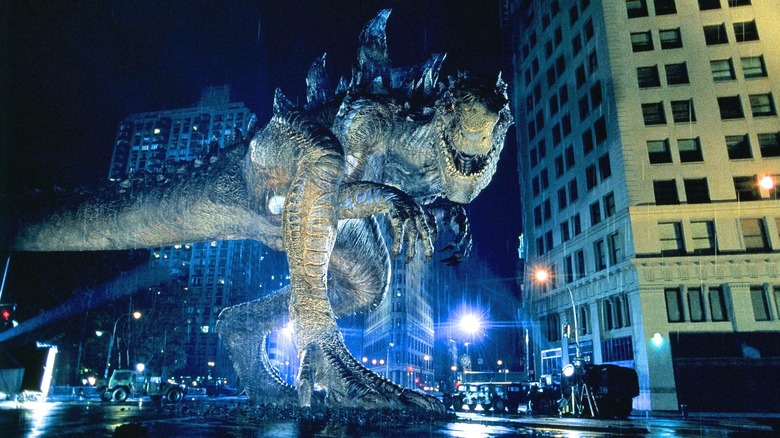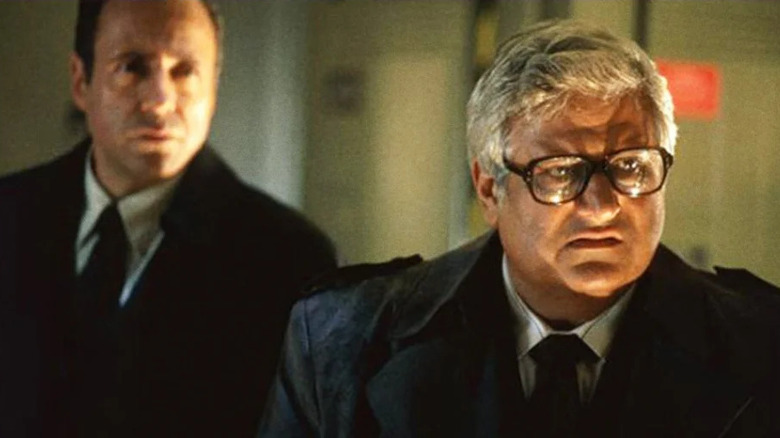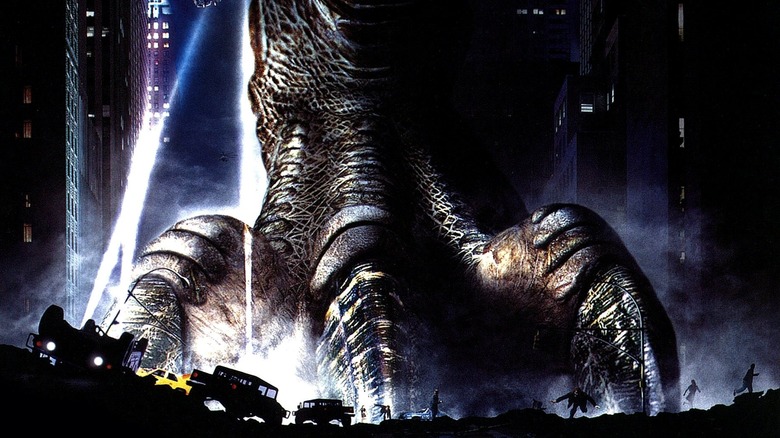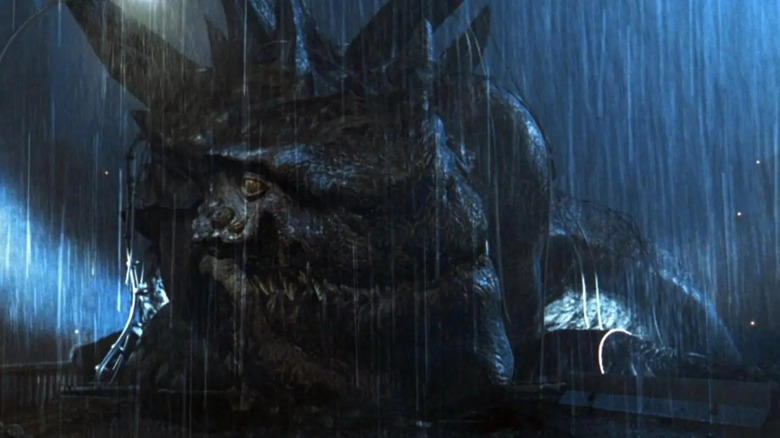Godzilla Once Took A Swing At These World-Famous Critics
Released in the summer of 1998, Roland Emmerich's "Godzilla" came at a time when the Japanese series was in hibernation. Godzilla's Heisei era, launched in 1984 with "The Return of Godzilla" (a.k.a. "Godzilla 1985" in the U.S.) came to a close in 1995 with the release of "Godzilla vs. Destoroyah," a film where Godzilla's internal radiation had become so strong, he glowed from the inside. In the film, he fought off an arch-nemesis, Destoroyah, born of the same weapon that killed Godzilla in the 1954 original. He then melted down like a f****** Viking. Godzilla, it seemed, was properly dead.
Meanwhile, American film studios had been trying to make their own version of Godzilla since 1992. After director Jan de Bont's version featuring Godzilla fighting a massive shapeshifting monster fell through, Roland Emmerich, who had just made the ultra-successful "Independence Day," took the reins, developing his own vision with screenwriter Dean Devlin. Emmerich's "Godzilla" was a decently sized hit that sported a pretty good soundtrack record, although critics and audiences panned it for its blunt stupidity, its lack of logic, and its clear rip-offs of the two "Jurassic Park" films that had been released at that point.
Film critics Gene Siskel and Roger Ebert were particularly unkind, pointing out that "Godzilla" was nonsensical (how can a 30-story-tall monster escape detection in a 20-foot tunnel system?) and, more importantly, simply not scary. They said that the film lacked the terror and majesty of earlier Godzilla movies — a series that Ebert wasn't fond of to begin with.
This wasn't the first time Siskel and Ebert panned a Roland Emmerich film: Ebert had given Emmerich's "Universal Soldier" two stars, "Stargate" one, and "Independence Day" a whopping two-and-a-half, the highest star rating a film can receive and still get a notorious "Thumbs Down." In fact, Siskel's and Ebert's rejection of Emmerich's earlier films inspired two characters in "Godzilla": Bumbling mayor Ebert and his sniveling assistant Gene, played by Michael Lerner and Lorry Goldman.
Mayor Ebert and Gene
In Emmerich's "Godzilla," the fictional mayor bungles every possible opportunity to deal with the title creature attacking New York City in a practical or mature fashion. The characters are depicted as smug, clueless, and helpless in a pinch: When Mayor Ebert announces that he might consider running for re-election, Gene gives him a "thumbs down." (The phrase "Two Thumbs Up," incidentally, is trademarked.) Mayor Ebert even looks an awful lot like Roger Ebert, and his assistant Gene like Gene Siskel.
But Siskel and Ebert were always fair in their criticisms. Like any professional critic, they were careful to give every film a chance and were keen to find great art wherever it might appear. And if they hated something, by gum, they'd let you know. Sometimes they hated movies so much, they lost their composure; as author Dave Barry said in regards to Ebert's review compilation "I Hated, Hated, Hated This Movie," there is a special pleasure in watching an otherwise staid critic lose his cool in the face of an aggressively awful movie.
So when Siskel and/or Ebert panned a movie, you knew they were being serious. That frankness incurred the ire of many filmmakers over the years. (For example, Ebert had infamous tiffs with Rob Schneider and Vincent Gallo over their films "Deuce Bigalow: European Gigolo" and "The Brown Bunny.") But both Siskel and Ebert took the abuse in stride.
Emmerich didn't go far enough
Siskel and Ebert, of course, also noticed that they were being lampooned in "Godzilla." But they weren't angry. In fact, they were miffed that Emmerich hadn't taken the gag as far as he could have. In Siskel's words, "if you're going to go through the trouble of putting us in a monster movie, why don't you at least take advantage of having the monster either eat or squash us?" And Mayor Ebert and Gene do get off light! They're not the smartest or most flattering figures, but they do escape. Even in his attempted insult of Siskel and Ebert, Emmerich seems to have whiffed it — just another notorious detail in a notorious film. To quote Ebert's review from the Chicago Sun-Times:
"Oh, and then there are New York's Mayor Ebert (gamely played by Michael Lerner) and his adviser, Gene (Lorry Goldman). The mayor of course makes every possible wrong decision (he is against evacuating Manhattan, etc.), and the adviser eventually gives thumbs-down to his reelection campaign. These characters are a reaction by Emmerich and Devlin to negative Siskel and Ebert reviews of their earlier movies ("Stargate," "Independence Day"), but they let us off lightly; I fully expected to be squished like a bug by Godzilla. Now that I've inspired a character in a Godzilla movie, all I really still desire is for several Ingmar Bergman characters to sit in a circle and read my reviews to one another in hushed tones."
"Godzilla" was a hit, but not big enough of a hit to continue a planned trilogy of films. Indeed, after the disappointment of America's first foray into making a "Godzilla" film, Toho returned the following year with "Godzilla 2000," a reboot that was the first of what would come to be called the Millennium era. The Millennium Godzilla films would continue through 2004, ending with Ryuhei Kitamura's "Godzilla: Final Wars." "Final Wars" featured more monster fights than any of the previous Godzilla films — including a cameo from Emmerich's Godzilla.
In a clever repurposing of the '98 film, Emmerich's monster was renamed merely "'Zilla," and the film establishes that Americans merely mistook their monster for the real Godzilla. The real Godzilla picks up 'Zilla and hucks it at the Sydney Opera House. It's the shortest fight in Godzilla history.
Modern criticsm
As for Siskel and Ebert, their beef with Emmerich has since turned into an ongoing, defensive battle between fans and critics, as when Samuel L. Jackson attacked A.O. Scott on social media for his pan of "Marvel's The Avengers" in The New York Times.
It bears repeating that criticism is not practiced by Olympian deities issuing decrees from on high about how an audience member ought to feel about a certain film. They're (ostensibly) written by film experts with a large vocabulary and a penchant for honesty. It is not a critic's job to reflect the excitement built up by the Hollywood hype machine, but to look past that machine at the film itself. If a critic walks away from a hotly anticipated film disappointed, they will say so. And if a filmmaker or an actor or a fan takes exception to a critic's opinion, that's nothing more than a disagreement, which can lead to discussion about a work of popular art. You know, the way conversations work.
Social media has turned modern criticism into a battleground where Rotten Tomatoes scores are wielded as scientific proof of a film's quality, and box-office numbers are evidence that a critic is wrong, wrong, wrong. Curiously, the hottest battles tend to be over the largest, most expensive blockbusters on the market, as fans leap to the defense of movies that have already made millions and shield multinational corporations from a single op-ed piece.
Perhaps we could all stand to be more like Siskel and Ebert.



